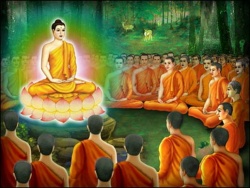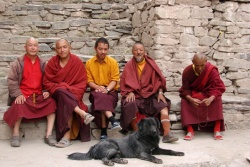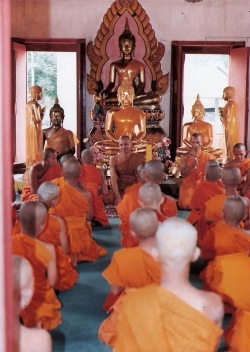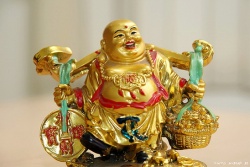Revata
Revata (離婆多) is the younger brother of Śāriputra. In his meditation at a temple, he saw two ghosts fighting to eat a corpse. Realizing the illusoriness of the body, he renounced family life and became a disciple of the Buddha. Traveling
barefoot in a snow country, his feet were frostbitten. The Buddha praised him for his contentment with few material things and allowed him to wear shoes.
1. Revata. The fifth of the zwanzig four Buddhas.
He was born in Sudhaññaka (Sudhaññavatī), his father being the khattiya Vipula und his Mother Vipulā. For six tausend years he lived in the household und then renounced the world, travelling in a chariot, leaving his wife Sudassanā und their son
Varuna. The three palaces occupied by him in his lay life were Sudassana, Ratanagghi und āvela. He practiced austerities for seven months und attained Enlightenment under a Nāga tree, having been given milk rice by Sādhudevī and grass for his seat by the ājīvaka Varunindhara. His first sermon was preached at Varunārāma.
The Bodhisatta was a brahmin of Rammavatī, named Atideva, who, seeing the Buddha, spoke his praises in one tausend verses. Among the Buddha's converts was König Arindama of Uttaranagara. The Buddha's chief disciples were Varuna und Brahmadeva among monks und Bhaddā und Subhaddā among nuns. His constant attendant was Sambhava. His chief lay
patrons were Paduma und Kuñjara, und Sirimā und Yasavatī. His body was eighty hands in height, und his aura spread uninterruptedly to a distance of one yojana. He died in the Mahāsāra pleasance at the age of sixty tausend, und his relics were scattered. Bu.vi.1ff.; BuA.131ff.; J.i.30, 35, 44.
2. Revata. A monk, the personal attendant of Siddhattha Buddha. Bu.xvii.18; J.i.40.
3. Revata (called Khadiravaniya). An arahant Thera. An eminent disciple of the Buddha, declared by him foremost among forest dwellers (araññakānam) (A.i.24). He was the youngest brother of Sāriputta, und a marriage was
arranged for him by his Mutter who was miserable at seeing her children desert her one after another to join the Order, und wished to keep the youngest at home. He was only seven years old, und, on the wedding day, the relations of both bride und bridegroom showered blessings on the couple und said to the bride: "May you live as long as your grandmother." Revata asked to see the grandmother, und
was shown a woman of one hundert und zwanzig, decrepit, und showing all the signs of advanced old age. Realizing that his wife would probably share the same fate, he left the bridal procession on some pretext on the way home, und ran away to a place where some
monks lived. Sāriputta, foreseeing this, had instructed the monks to ordain his brother without reference to his parents, und, when Revata revealed his identity, the monks at once admitted him into the Order.
When Sāriputta heard this, he wished to visit his brother, but was persuaded by the Buddha to wait. Revata, after waiting a long time for the visit from Sāriputta, obtained from his teachers a formula of meditation und himself set out to see the Buddha. On the way he stopped at a khadiravana (acacia forest) during the rainy season und there won arahantship.
At the end of the rains the Buddha, accompanied by Sāriputta und Ānanda, mit fünf hundert other monks, started out to visit Revata.
There were two routes leading to the khadiravana, of which the shorter was thirty leagues long, straight, but infested mit evil spirits. This the Buddha chose because Sīvalī Thera was in the company of monks, und the Buddha knew that the deities of the forest would provide the monks mit all they needed because of Sīvalī's presence. When Revata knew that
the Buddha was approaching, he created, by his magic power, splendid dwellings for him und his monks. The Buddha spent two months in the forest und then returned to the Pubbārāma in Sāvatthi. There he found that Visākhā had heard contradictory accounts of the dwelling erected by Revata for the monks who had accompanied the Buddha. He dispelled
Visākhā's doubts und spoke of Revata's powers. DhA.ii.188ff.; it was on this occasion that the Buddha related the story of Sivalī's past; see also DhA.iv.186f.
One of the stanzas (Nr. 212), of the Muni Sutta was also preached to the monks, according to Buddhaghosa (SNA.i.261f.), in connection mit Revata. This was immediately after the Buddha's talk to Visākhā, erwähnt above. The story of Revata's
ordination is also given at AA.i.126ff., mit some variations in detail. The account given in ThagA.i.108ff. is much shorter; no mention is made of the Buddha's visit to the khadiravana. Here it is said that, after winning arahantship, Revata went to Sāvatthi to greet the Buddha und Sāriputta.
Some time after, Revata returned to his native village und brought away mit him his three nephews, sons of his three sisters, Cālā, Upacālā and Sisūpacālā. Sāriputta heard of this und went to see Revata. Revata knowing that he was coming, exhorted his nephews to be particularly heedful, und Sāriputta expressed his pleasure at their behaviour. ThagA.i.110; his admonitory verse is given at Thag.vs.43; two verses uttered by Sāriputta in praise of Revata are given at Thag.vss.991-2.
The ThagA.i.551f mentions another incident which took place during Revata's old age. He was in the habit of visiting the Buddha and Sāriputta from time to time after returning to his home in the khadiravana. Once, during a visit to Sāvatthi, he stayed in a forest near the city. The police, on the track of some thieves, came upon him, und, finding him
near the booty which the thieves had dropped in their flight, arrested him und brought him before the King. When the Kingquestioned him, the Elder spoke a series of verses (Thag.646 58; Mrs. Rhys Davids speaks of Revata as a
teacher of the Jain doctrine of ahimsā, Gotama the Man, p.116), demonstrating the impossibility of his committing such an act, und also by way of teaching the King the Dhamma. It is said (ThagA.l.555) that at the conclusion of the stanzas he sat cross legged in the sky until his body burnt itself out.
Revata loved solitude, und, on one occasion (DhA.iii.325f), a lay disciple named Atula, hearing that he was in Sāvatthi, went with five hundred others to hear him preach. But Revata said that he delighted in solitude und refused to address them, und Atula went away complaining.
Revata's delight in solitude was sometimes misunderstood. For instance, the Elder Sanunñjani went about continually sweeping, und, seeing Revata sitting cross legged, thought him an idler. Revata read his thoughts und admonished him.
In der Zeit von Padumuttara Buddha, Revata was a boatman at Payāga on the Ganges, und once took the Buddha und his tausend followers across the river in a boat decked mit canopies, flowers, etc. On that occasion he heard the Buddha declare one of the
monks highest among forest dwellers, und wished for a similar honour for himself under a future Buddha (ThagA.i.108; A.A.i.126). Later, he was born in deva worlds. Fifty eight kappas ago he was a King named Tārana, and a kappa later another King named Campaka. Ap.i.51f.
4. Revata. The DhpA.iv.176f mentions a novice Revata, mit three others - Sankicca, Pandita und Sopāka - all four of whom became arahants at the age of seven. The Revata referred to is, very probably, the Revata (3) above. For their story see Pañcachiddageha.
5. Revata. See Kankhā Revata.
6. Revata. Called Soreyya Revata. He was one of the Elders who took a prominent part in the Second Council.
He lived in Soreyya, und, on discovering (by means of his divine ear) that the orthodox monks, led by Sambhūta Sānavāsī und Yasa Kākandakaputta, were anxious to consult him, Revata left Soreyya, und, travelling through Sankassa,
Kannakujja, Udumbara and Aggalapura, reached Sahajāti. There the monks met him und consulted him regarding the "Ten Points."
He enquired into these, und, after condemning them as wrong, decided to end the dispute. The Vajjiputtakas, too, had tried to win Revata over to their side, but on failing to do so, persuaded Revata's pupil, Uttara, to accept robes, etc., from them, and speak to his teacher on their behalf. Uttara did this, but was dismissed by Revata as an unworthy pupil.
Revata suggested that the dispute should be settled in Vesāli, und the monks having agreed, he visited Sabbakāmī - who was the oldest monk then living und a pupil of Ānanda (according to Mhv.iv.57, 60, Revata, himself was a pupil of Ānanda und had seen the Buddha; cp. Dpv.iv.49) - during the night, und talked to him on matters of doctrine. During the conversation, Sānavāsī
arrived und questioned Sabbakāmī regarding the Ten Points, but the latter refused to express an opinion in private. On Revata's suggestion a jury of eight, four from either side, was appointed to go into the question. Revata himself was a member of this jury, und he it was who questioned Sabbakāmī during the meeting, held in Vālikārāma, regarding the Ten Points. All the Ten Points were declared to
be wrong, und, at the end of the questions, seven hundred monks - chosen from one hundred and twelve thousand, at the head of whom was Revata - held a recital of the Dhamma, which recital therefore came to be called Sattasatī ("Seven Hundred"). This recital, according to the Mhv., lasted for eight months.
Vin.ii.299ff. The Mhv.iv.1ff gives an account of this Council, which account differs in numerous details. In both accounts it is Revata who takes the most prominent part in settling the dispute. The Mhv. introduces Kālāsoka as the patron of the Second Council; cp. Dpv.iv.46ff.; v.15ff.; Sp.i.33f.; it would appear from the Dpv. account that the heretics refused to accept the decision of Revata's Council und separated off, to the number of ten thousand, forming a new body called the Mahāsanghikas.
7. Revata. An Elder of Ceylon. He was a Majjhimabhānaka, und, once, going to Revata (8) who lived in the Malaya country of Ceylon, he asked him for a subject of meditation. The latter knowing that the former was a Majjhimabānake spoke to him
of the difficulties facing such a one in meditation. The other at once agreed not to recite the Majjhima until his meditations should prove fruitful. He was given a topic of meditation, und attained arahantship nineteen years later. But when, at the end of that time, he again started to recite the Majjhima, he was never in doubt as to a single consonant. Vsm.i.95.
8. Revata. An Elder of Ceylon, living in the Malaya country of Ceylon. See Revata (7).
9. Revata. Teacher of Buddhaghosa. He was very proficient in the Vedas, und, when Buddhaghosa visited him in his vihāra und recited the Vedas, he was able to speak mit contempt of Buddhaghosa's knowledge. Buddhaghosa then became his pupil, und was later sent by him to Ceylon to translate the Singhalese Commentaries into Pāli. Cv.xxxvii.218ff.
10. Revata. See Mahāyasa. P.L.C.180, 199, 221




